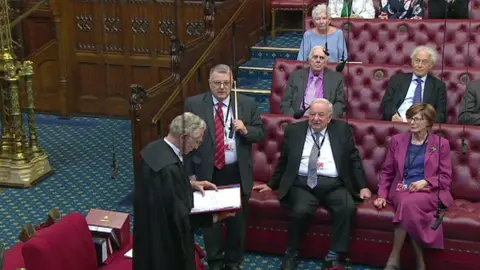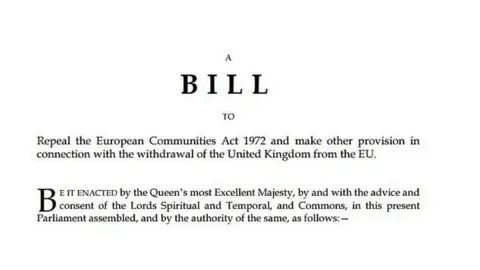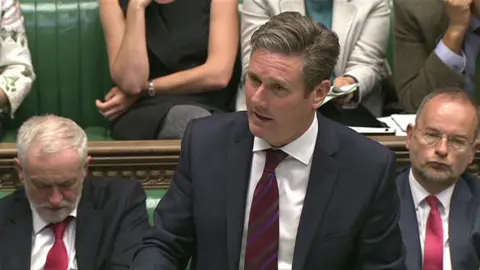More defeats to come in Lords Brexit battle
 Hol
HolThey always knew it was going to be tough.
Last night's double defeat in the House of Lords cannot have come as a surprise to the beleaguered band of Brexit ministers in the Upper House.
After being mobbed for weeks at committee stage, they are now losing votes and will continue to lose them, as the bombardment continues over five more days of report stage consideration.
So far, peers have inserted a quite tentatively worded amendment on keeping the UK in "a" Customs Union with the EU, and a second on how rights would be protected once the UK comes under what will be known as 'EU retained law' after Brexit.
On the scale of the defeats - majorities of 123 on the first and 97 on the second, there will be plenty more.
What's next?
Big amendments lie ahead on two critical issues, Parliament's "meaningful vote" on the final divorce deal, and the border with the Irish Republic lurk further down the track....and there are plenty more on everything from animal sentience to the apparently tekky but extremely important question of whether ministers should be allowed to change the law by statutory instrument if they deem it "appropriate" or "necessary."
And, unsurprisingly, there's an amendment proposing a referendum on the final deal.
Each change to the bill has to be referred back to MPs - no bill can become law until it is approved in exactly the same form by both houses of Parliament - in the convoluted process known as "parliamentary ping-pong".
Only if they are backed by MPs will the changes voted through by peers actually stick.
 Hoc
HocAnd here's the real question raised by these votes. Can the government muster the votes in the Commons to override the Lords amendments?
The Brexit minister Lord Callanan has already signalled the government's intention to try, although the Leader of the Commons Andrea Leadsom was a bit more noncommittal.
But given Theresa May's precarious Commons position, it is not a done deal that ministers will be able to throw the amendments out.
There are 10 Tory MPs signed up to a new clause (NC5) proposed to the Trade Bill which is actually a bit tougher than the Lords amendment, saying: "It shall be the objective of an appropriate authority to take all necessary steps to implement an international trade agreement which enables the UK to participate after exit day in a customs union with the EU."
That is more than enough to cancel out the majority provided by the Conservatives deal with the Northern Ireland DUP..... which explains why the Trade Bill has not returned to the Commons for report stage consideration, despite clearing committee stage on 1 February. I suppose the question is whether the soft Brexit Conservatives would consider this the right moment to strike, or would they prefer to wait until the final deal was on the table, later this year.
Next Thursday's backbench debate on a customs union, proposed by the super-committee of select committee chairs, the Liaison Committee, will be a dress rehearsal for the battle, whenever it is joined - but the government will not consider the vote at the end to be binding. All the same it piles the pressure onto ministers.
The strategic aim of pro-EU peers in the Lords is to throw back as many difficult Brexit issues as possible to the Commons, in the hope that pro-EU MPs - and above all Tory MPs - will defy their whips and uphold the amendments. So the band of Tory Europhiles will be under enormous pressure, from whips, colleagues, local parties and local voters.
This is not recreational rebellion on a side issue. Voting to overturn the government's Brexit policy risks overturning the prime minister, splitting the Cabinet and the Conservative Party, possibly triggering a further referendum, or even a general election.
The pro-EU side's hope is that the PM would embrace their "soft Brexit" approach and marginalise the hard Brexit wing of the party, in the knowledge that she could not get a "hard Brexit" through Parliament.
But it is far from clear what would happen if Parliament effectively threw out the government's negotiating strategy - and any Conservatives who helped it happen could expect serious retribution.
Of course this is not just about Tory rebels; for the government to lose Commons votes, Labour has to whip against it.
 Hoc
HocKeir Starmer, the shadow Brexit secretary entered the Commons as a high-powered lawyer, but has since metamorphosed into a politician.
He has tweeted his approval of the Lords vote, and has carefully positioned his party so that it can swoop on Tory disarray. While a handful of Labour MPs might vote with the government on some Brexit issues, the prospect of inflicting serious damage on ministers would probably provide most Labour Brexiteers with an acceptable pretext for not doing so.
And then there are the hard-core Remainers.
Economic argument
Just before Easter, I went to a lecture by Tony Blair in the Speaker's House.
It was interesting on several levels - there were old and new Blairites bathing in the radiance of the Master, teeth agleam, as he set out a strategy to stop Brexit altogether.
His key point was that ministers should not be permitted to get away with fudging the difficult parts of Brexit in the forthcoming "meaningful vote". He predicted the government's main aim would be to get the UK through the exit, while glossing over what he said would be the considerable economic damage of leaving - and he said Remainers had to expose that damage in order to make the case for a referendum to approve or (he hoped) reject Brexit.
That puts a considerable focus on the political declaration on the future framework for UK-EU relations, which will accompany the exit agreement.
Will this be a concrete draft agreement or a set of promises that politicians of goodwill can work out difficult issues later? This document looks likely to be the focus of the Blair-Remain strategy - but always remember that the MPs who fought a long guerrilla campaign to extract the referendum promise from David Cameron have not gone away, and will doubtless be preparing their counter-offensive.
